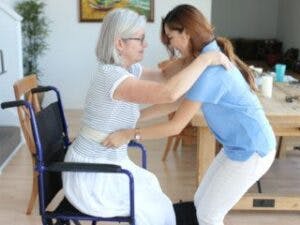How a Caregiver Can Help with Stroke Recovery

If you or your loved one recently suffered a stroke , the road to recovery may be somber and difficult, as some strokes leave long term effects and damage.

After a stroke, it can be tough to get back to life as it once was before. It is important to know that as you or your loved one starts to get settled into their new routine, the only person who should give you a detailed and prescribed care plan is a medical professional. After a stroke, it is advised to seek out medical advice from a professional, where he or she can diagnose you officially with temporary or permanent damages as a result of the stroke. Depending on your diagnosis, he or she will likely advise a prescribed care plan and lifestyle changes which can include eating a healthier diet, exercising regularly and making sure they get enough rest.
So, How Can a Caregiver Help?
Hiring an in-home caregiver can give you and your family the peace of mind that you need after suffering a stroke. Caregivers are individuals that use their time, energy and knowledge to serve their clients by making their home a safe and enjoyable place for them to be, especially after a traumatic experience such as a heart attack, a fall or a stroke. For people that have had a mini stroke, or a transient ischemic attack (TIA), a caregiver can be the perfect fit for temporary help during their short recovery period.

Unfortunately, since a stroke blocks blood flow to the brain, sometime individuals who have suffered from such a traumatic experience have permanent or long-term side effects and complications. Although some of these complications may go away over time, they can be very difficult to live with in the meantime. Complications from a stroke include:
- Increased pain on the side or sides that the stroke occurred in. Often time if an individual experienced limited feeling in one of their legs, that leg may hurt them or have tingling aches from time to time.
- Memory loss is not uncommon after a stroke, as brain damage is one of the biggest fears after an individual experience a stroke. Since part of the brain did not receive blood flow during the stroke, this can cause difficulty thinking and may impair the ability for the individual to understand certain situations or feelings.
- Difficulty swallowing, talking or eating may occur after an individual suffers from a stroke, as the muscles in the throat and the mouth may be damaged and unable to function fully.
- Paralysis or loss of movement in one or both sides of the body is common, especially if that was the main sign or symptom of a stroke that caught the attention of the individual.
Services that Caregivers Provide for Stroke Survivors
An in-home caregiver can help a person that has suffered a stroke navigate through their daily tasks in a safe, productive and positive manner. By hiring an in-home caregiver, family members can be assured that the person who is being cared for is in good hands, while the patient themselves can feel comfortable that they will be looked after carefully. Caregivers can provide a wide range of services to help an individual that has suffered a stroke including:

- Personal care such as assistance with bathing, personal hygiene, dressing or grooming and walking around their home. Individuals that have suffered from a stroke may have limited abilities to use their arms and legs or they may simply forget to brush their teeth or take a shower that day. Having an in-home caregiver assist with personal care ensures the stroke survivor is clean, healthy and that they are properly cared for during their recovery.
- Light housekeeping assistance can ensure that the home is both tidy and safe for the individual who is living there during their stroke recovery. In-home caregivers who help with light housekeeping will maintain the cleanliness of the home by making sure the bedroom and bathroom are up to cleanliness standards, organizing any clutter of the home, taking out the trash, laundry and washing dishes.
- Meal preparation allows the client in stroke recovery a chance to be guaranteed and confident that they will receive proper meals that will be prepared by an in-home caregiver. Utilizing meal preparation through a caregiver can be a wonderful way to have the grocery shopping completed, prescribed meal plans abided by and ensure that the patient is eating and drinking enough through out their day!
- Medication reminders ensures that the individual that suffered from a stroke complies with the prescribed care plan from their medical professional. Part of healing and recovering from a stroke is being compliant to a strict, rigorous and necessary care plan. Having a caregiver assist with medication reminders is a great way to make sure the individual is taking the proper dosage at the right time, keeping them healthy and happy.
- Companionship through the help of an in-home care provider allows you or your loved ones to continue to live their life in the company of someone who will be there for them when they need them the most. A caregiver can assist a stroke client with socialization, hobbies and playing games with them to keep them busy. A caregiver is available to an individual who has suffered a stroke to not only help them with their day to day tasks, but to keep them happy and fulfilled in their daily social interactions as well.
Whether you or your loved one are in the early stages of stroke recovery or are trying to find avenues of happiness in the middle of recovery, an in-home caregiver can help. Hiring an in-home caregiver gives family members peace of mind, while their loves ones are left in good hands. A stroke does not have to define your life, and with the help of a trained professional, it doesn’t have to.
